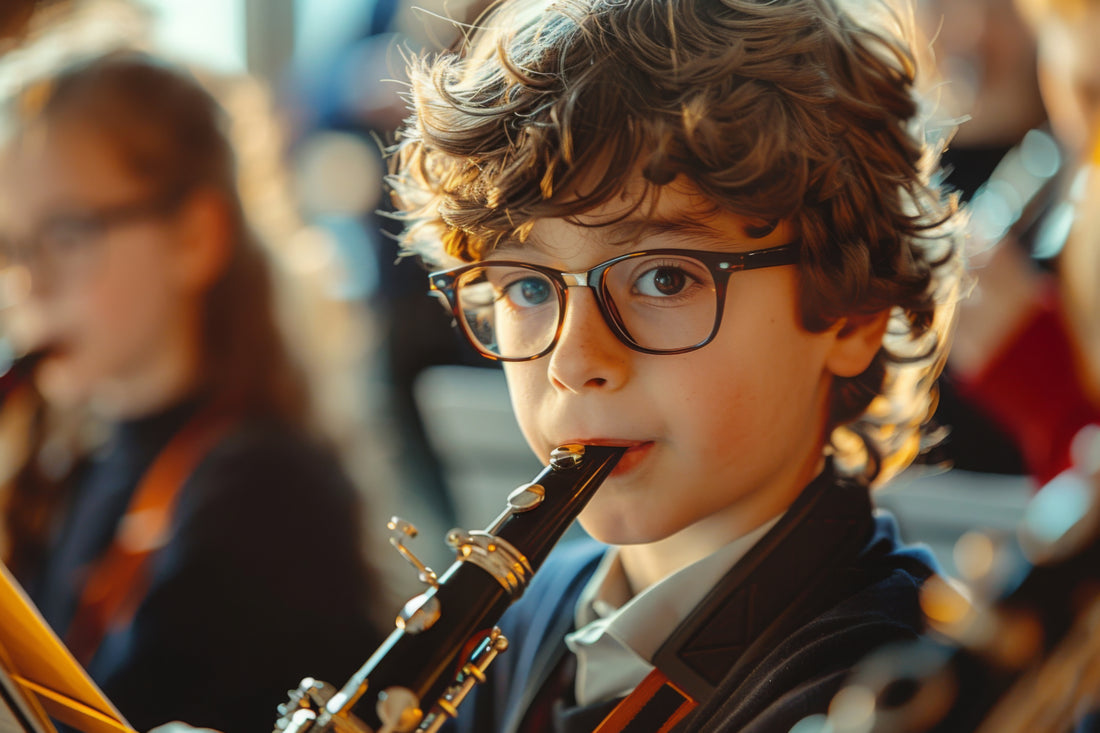1. Music Develops Fine & Gross Motor Control
A lot of the time, when we hear music, we want to move! No matter the way we wiggle, dance, or sway, we can’t overlook the ways that music supports the development of fine and gross motor skills. As children’s fine and gross motor abilities grow, so does their excitement. All of the children in our program are so proud to show their parents all that they can do in our seasonal performances to celebrate the Holiday season, Mother’s Day, Father’s Day, and more.
Gross Motor Development
Whether it’s standing or being held and rocked, we start seeing the large muscles in the legs and arms wiggle beginning in our Infant class as the children dance to both slow and fast music. As they get older and progress to our Toddler and Two-Year-Old classrooms, they’ll start doing more complex movements alongside a rhythm, engaging and building muscles in their arms, legs, and trunk. Every day in the classroom, as they improve their brain and body coordination, they’ll become better at swaying or shifting their weight from one foot to the other, improving their balance and falling less.
Fine Motor Development
As your child grows older, they’ll begin to incorporate more fine motor control. They’ll play with instruments that require different grasps and movements, such as toy guitars, rattlers, and rice shakers. They’ll learn new fingerplays and action rhymes where they coordinate hand and body movements with a song, and become experts in dancing to the “Itsy-Bitsy Spider” and “Head, Shoulders, Knees, and Toes” in our Preschool and Pre-K/TK classrooms. Combining both instruments and new body movement/awareness builds important connections in the brain, boosting sensory development. Remember that regardless of the musical play your child engages in, it’ll complement the fine motor skills required for other activities in their life, such as writing and drawing.
2. Music Builds Connection
A baby is listening and learning before they’re even born, and singing lullabies to your newborn is some of the first ways you’ll bond. In fact, research shows that singing captures the attention of your infant more effectively than speech. The higher pitch, warmer tone, and familiar lyrics will surely soothe your baby, and boost a sense of security and support.
In addition to music fostering intimate relationships in your baby’s life, it also plays a significant role in fostering an inclusive community in classrooms of all ages. Did you know that in the US, 1 in 4 children has at least one immigrant parent? Exposing children to diverse music is a great way to introduce them to different cultures from around the world.
Music from different cultures highlights different instruments, languages, styles, and practices, and is a powerful way for children from different backgrounds to connect with both their own and their friends’ families and communities. Here at Kids’ Care Club, we believe that music in the classroom serves as a way to unify home and school, acting as a powerful tool to incorporate multicultural music and sounds to create an inclusive and connected worldview early on. 
3. Expands Communication & Imagination
Learning to speak is a natural process for most children. It all begins with your little one picking up language through exposure. Communication at its earliest stage, such as babbling and cooing, helps your baby develop the neural pathways that are necessary for later listening and speaking. Infants that hear language directed to them tend to babble more, and gain larger vocabularies by toddlerhood and beyond. Through lullabies, nursery rhymes, and music, your child has ample opportunity to babble their way through songs, slowly learning and mimicking the music and sounds they hear around them as a means of making sense of the world around them.
As they grow older, they will be introduced to more songs and rhymes that expand their vocabulary and teach them to use their words better. Popular songs in the classroom will help them memorize new words, with increased exposure helping them grow more comfortable with more difficult language patterns. Greater exposure to new music will help them develop greater fluency, understanding, and comprehension as they progress past preschool age.
4. Brain Development
Cognitive Functioning
Listening to music lights up multiple areas of the brain as it processes the sound, deconstructs different elements like melody and rhythm, and puts it all together for a unified musical experience. As your child begins to play music on their own, they continue to engage different areas of the brain, especially the visual, auditory, and motor cortices. This increased cognitive functioning may translate to other activities in their life. Music helps overall brain development, creating pathways in the brain that improve a child’s cognitive functioning.
Auditory Perception
Auditory perception is the brain’s ability to understand what it hears through the ears. Music is the perfect way to develop these auditory perceptual skills, as it’s fun and takes little effort! This skill will help them succeed in future activities like reading, where they must be able to hear various sounds, distinguish them from one another, and manipulate them. Over time, they’ll be able to apply these skills to other activities like writing as they join different sounds they hear, and break them apart in order to spell on their own.
Memory
Our brains, starting at an early age, have the capability to make, store and retrieve memories of music even when we’re not aware. Through listening and making music in the classroom, your child will greatly expand their vocabulary and hone in on their ability to use language correctly. Repeating popular rhymes and songs in the classroom at home will help them memorize new words, learn new language patterns, and better understand how words are placed together to better help them approach future learning experiences.
5. It makes them happy!
Most importantly, music makes your child happy and keeps learning fun! Just as a song can soothe your child, it can lift them up. Use music together to dance and create excitement together as a family, just as they do in the classrooms here at KCC. Together, you can lean into the music as a fun means of self-expression, and be reminded of how good it feels to move your body, bop your head, and wiggle to music without fear of judgment!

Go Dance and Make Music!
From lullabies, sing-a-longs, nursery rhymes, and more, there are so many reasons to implement music at home. Music is a shared, expressive way to just be together. If put to work, it can be a powerful force in the lives of young children and families. from https://kidscareclub.com/why-music-is-important-for-child-development/

